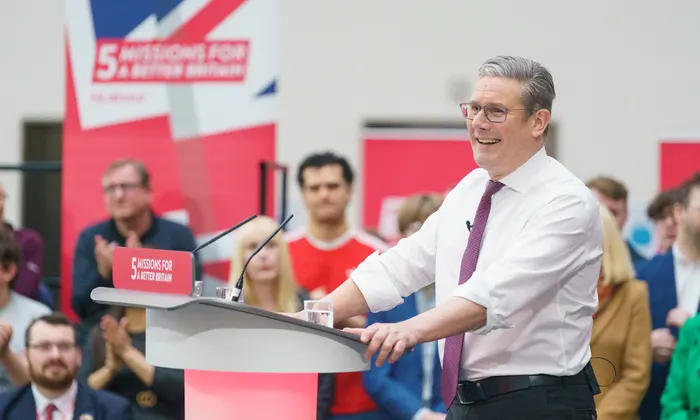Aside from being 28% ahead in the polls, a sure sign that a party is on the threshold of power, is its leader receiving a ferocious roasting on the BBC’s Today show. Keir Starmer, laying out his “five missions” covering the economy, the NHS, crime, the climate crisis and education, was stress-tested in that boxing ring on Thursday morning. He stood up to it pretty well, as you’d expect of a former chief prosecutor.
The line of attack on him is the one that he will face through the next election: why had he broken the pledges he made in his leadership campaign? Pledges, the BBC’s Amol Rajan claimed, are for life, echoing attacks from right and left. The Tory chairman, Greg Hands, said that Starmer would “say anything if the politics of that moment suit him”. Momentum said: “His promises lie in tatters, ditched in favour of the reheated third-way Blairism typified by these latest, vapid ‘missions’.” Sky asked him after his speech: “Why should anyone believe a word you say?”
The answer, inevitably, is that when the facts change, then policies must change too. Since those pledges there have been Covid, Ukraine and the Liz Truss “kamikaze” budget. Voters may hate U-turns and flip-flops, but they may be convinced by his reply: with energy prices through the roof, would you spend a small fortune compensating shareholders by nationalising energy companies, or choose his windfall tax on excessive profits and his green Great British Energy company, which would work alongside the private sector?
He refuses to repeat a pledge to abolish tuition fees, but promises radical reform (expect a graduate tax). Why? Wait for the education announcement, but expect it to declare affordable childcare and a return to Sure Start-quality nurseries. Funding is better spent on universal early years interventions than on already successful students in their late teens.
Starmer’s speech won’t electrify anyone with dazzling new policies, as his missions lay solid foundations on which the manifesto will be built; roof and windows to follow. What strikes anyone who studied him three years ago is the long way Starmer himself has travelled in self-confidence and authority. He looks like a convincing prime minister because he has convinced himself. Boring? Only a bit. But there are worse things to be, as the country knows to its cost from our last two prime ministers.
Look how well his slow, strategic steps have done so far, without splurging too early with promises that are either tired or irrelevant by the next election. In fact, bit by bit, he has been announcing policies that reflect his principles: 19m homes insulated, the right of trade unions to recruit in every workplace (take heed all those Amazon “fulfilment centres”), VAT on private school fees to fund teachers in state schools, abolishing non-doms to train thousands more medical staff, and 10 experiences every primary-age child will get by age 10.
Personally, I would ban any UK politician from promising “world-leading” or “world-beating” anything: it would be great if we could catch up with the rest. Starmer’s promise to bring “the highest sustained growth rate in the G7” may be possible from such a low base, but it feels hubristic: do it first, boast afterwards. Where he scores is his oft-repeated promise of long-term, ambitious plans that will take time, no quick fixes, “as we lurch from crisis to crisis” suffering “a last gasp of a party caught between a rock of stagnation and the hard place of economic recklessness”.
On Thursday, right on cue, came a dismal reminder of what Labour will face if it wins the election. The weighty annual report from the Institute for Government on the state of public services landed with a thump, painting a yet more dismal picture of the country’s crisis-hit civic and social fabric.
At the next election NHS waiting lists will still be far above 2019 levels, let alone 2010’s. “Pupils will not catch up lost learning, and the social care provider market will not be put on a sustainable long-term financial footing … the situation in prisons and courts is arguably worse.”
The cost of higher pay will be taken from budgets that already “do not provide the level of funding for major improvement”. IFG research unequivocally traces these black holes back to 13 years of austerity, which left the country without the resilience to face Covid and war in Ukraine. Staffing targets are badly missed everywhere, not just in the NHS and care, but schools and police. Just 17% of the target number of physics teachers were recruited in England last year.
Labour’s caution in never announcing spending without sourcing the cost is wise: imagine how tough it will be as each new minister arrives in their department to open the books, and the chancellor has to choose between scores of desperate priorities. Talking firmly now about long-term plans and not instant fixes lowers immediate expectations, but raises future ones to a better horizon. This will need two terms in power. The emblem that signifies all that long-term thinking is the 10,000 new places for trainee doctors, who will take 10 years to fill those vacant wards and GP surgeries.
Reports /TrainViral/

 Fashion2 years ago
Fashion2 years ago
 Politics2 years ago
Politics2 years ago
 Politics2 years ago
Politics2 years ago
 Everything About Youtube2 years ago
Everything About Youtube2 years ago
 Fashion2 years ago
Fashion2 years ago
 Politics2 years ago
Politics2 years ago
 Everything About Youtube2 years ago
Everything About Youtube2 years ago
 Tech2 years ago
Tech2 years ago







